The US specialists funded and organized a network of secret bases on the territory of the former Soviet state and made Kiev a part of a “secret coalition” against Moscow, the paper said, citing a host of current and former officials in the US, Ukraine and Europe.
Ukraine currently hosts at least 12 secret spy bases located near the Russian border that gather all sorts of information on Russia as well as coordinate drone strikes and a network of agents supposedly operating inside Russia.
The NYT journalists were able to visit one such forward operating base located in an underground bunker. The reporters said that the place was used to eavesdrop on Russian military communications and oversee drone strikes on Russian territory. The base was funded and equipped by the CIA, NYT added, citing a senior Ukrainian intelligence official, General Sergey Dvoretsky.
The US intelligence agency particularly equipped the base with communications equipment and large computer servers, the general told the daily, adding that the bunker was used to hack into Russian, Belarusian and Chinese satellites.
According to the newspaper, the CIA and other American intelligence agencies also supplied Ukraine with information on Russian troop movements and missile strikes throughout the ongoing conflict between Moscow and Kiev.
The active cooperation between the two nations’ intelligence services started almost immediately after the 2014 Maidan coup and Kiev has since turned into “one of Washington’s most important intelligence partners against the Kremlin”, NYT said.
The post-coup Ukrainian authorities actively sought America’s approval by particularly handing over Russian secrets to them since the US had little interest in assets that could not produce any intelligence of value on Moscow, NYT reported.
In 2015, the then head of the Ukrainian military intelligence, General Valery Kondratiuk, handed over a stack of top-secret files, including information on the Russian Navy’s Northern Fleet and nuclear submarine designs at a meeting with a CIA deputy station chief in Kiev.
A year before that, the then head of the Ukrainian domestic security service (SBU), Valentin Nalivaichenko, who was appointed by the post-coup authorities, approached the local CIA and MI6 chiefs, seeking a three-way partnership and asking them to help him rebuild his service from scratch.
In 2016, the CIA started training an elite Ukrainian commando force known as Unit 2245. General Kirill Budanov, who currently heads Ukrainian military intelligence, is also a former member of the CIA-trained Unit 2245, according to NYT.
American spies also provided specialized training to members of the Fifth Directorate – a paramilitary unit created by Kiev for operations against Russia. The members of this hit squad were involved in some high-profile assassinations in Donbass, including that of a commander Arsen Pavlov, aka ‘Motorola’, who was blown up in an elevator in 2016, NYT said. Existence of the assassination unit was also revealed by Nalivaichenko in a separate interview with The Economist in September 2023.
The US intelligence operatives were also instrumental in Kiev’s response to the start of the Russian military operation in February 2022. The CIA operatives remained at a certain location in western Ukraine while the US was evacuating its personnel from the country ahead of the conflict.
“Without them, there would have been no way for us to resist the Russians,” Ivan Bakanov, another former head of the SBU, told NYT.
Moscow has repeatedly pointed to the threats to its national security coming from the increased US activities on Ukrainian territory and Kiev’s NATO aspirations. It also cited the need to ensure Russia’s security as one of the reasons for the start of its military operation in February 2022, while Kiev maintained that Moscow’s actions were “completely unprovoked”.
